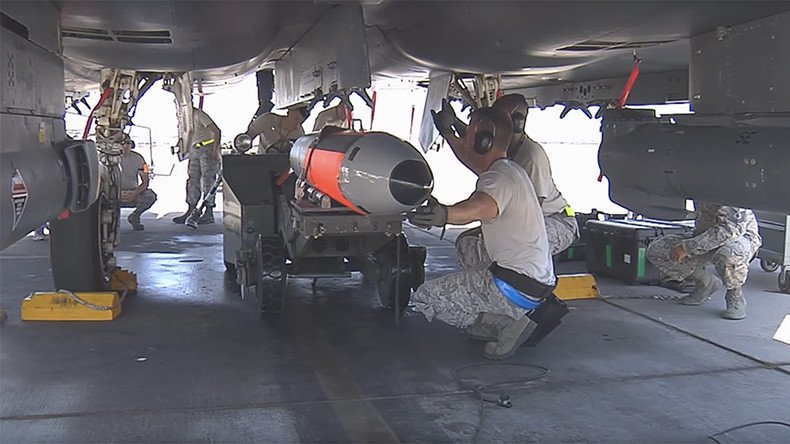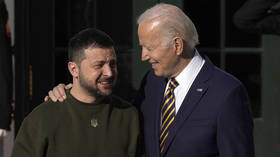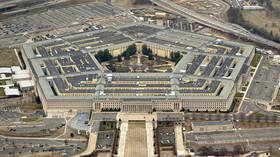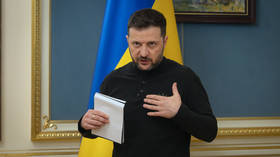US deployment of new B61-12 nukes to Europe would violate non-proliferation treaty – Moscow

Washington will violate its commitment to the Non-Proliferation Treaty if it deploys the new B61-12 nuclear bombs to NATO allies in Europe, the Russian Foreign Ministry has warned. The statement comes after the recent second test of the weapon.
“The most recent variations of the B61-12 bombs are also designed for deployment to the territory of a number of NATO countries in Europe for use as part of the so-called nuclear missions involving pilots from the alliance’s non-nuclear member-states," the director of the Russian Foreign Ministry’s Department for Non-Proliferation and Arms Control Department, Mikhail Ulyanov, told TASS news agency.
“According to our assessment, this runs counter to the NPT [the Non-Proliferation Treaty] commitments,” the Russian diplomat said on Tuesday after the US National Nuclear Security Administration (NNSA) announced it had conducted the second successful flight test of B61-12 gravity nuclear bombs in Nevada.
Ulyanov recalled his previous doubts about the upgraded weapon, which he says could “lower the threshold of using nuclear weapons.”
“US military specialists claim that this bomb will be more ethical and more usable, because it has greater accuracy and results in less catastrophic effects for civilians if used on vast areas," Ulyanov said.
“This prompts the conclusion that when they go operational, such bombs may objectively lower the threshold of using nuclear weapons. We see this as the key negative effect of the ongoing upgrade work.”
The US has repeatedly accused Russia of NPT violations to cover the upgrade of its own nuclear arsenal, the diplomat believes.
“There is such a feeling that these accusations serve also as a smoke screen to modernize rather dangerous US potential,” Ulyanov stated.
The editor-in-chief of National Defense magazine, Igor Korotchenko, warned that the second test of the nuclear bomb could indicate that the US is speeding up its rearmament program while “both Washington and Brussels are considering the scenario of a limited nuclear war in Europe.” He added that NATO forces have already conducted drills in the Baltic Sea, including mock nuclear strikes on Russia.
“During regular exercises, including those in the Baltic Sea, the air forces of NATO countries have repeatedly carried out combat training tasks involving tactical nuclear strikes on targets located in the northwest of our country,” the military observer told RIA Novosti on Tuesday.
It is not the first time Moscow has voiced concern over the possible consequences of US nuclear modernization plans. In 2016, Ulyanov said that the new B61-12 weapons would not necessarily be used solely by the US, but delivered to NATO allies in Europe, including Belgium, Germany, Italy, the Netherlands and Turkey.
“That is when the negative impacts of the modernization will truly be felt,” the diplomat said, adding that the renewal of the US nuclear arsenal in Europe means a long-term extension of NATO's joint nuclear missions, which “flagrantly violate the spirit and contents of the Treaty on the Non-Proliferation of Nuclear Weapons.”
Back in 2016, Moscow also vowed to respond with “adequate” counter-measures to US plans to expand its nuclear potential.
The first production of the new B61-12 nuclear weapon is scheduled for 2020, and will see it replace the B61 nuclear gravity bomb, the oldest weapon in the US stockpile, according to the NNSA.
READ MORE: Russia worried less powerful US nuke will be ‘more tempting’ to use
Some 180 B61 bombs are housed at NATO bases in five European countries mentioned by Ulyanov – Italy, Belgium, the Netherlands, Turkey and Germany – according to a report by the Peace Action group. At the same time there are “approximately 300 more B61 nuclear weapons in storage in the United States,” according to the organization’s estimates.
“The B61-12 LEP will deliver the new capability of being able to lower the explosive yield and will include a new tail kit that will give the nuclear weapon a new $800 million precision guidance capability – these same capabilities were rejected by Congress in 1994 over concerns they would lead to more useable nuclear weapons,” Peace Action stated. The report added that “increasing capabilities of nuclear weapons goes against the spirit and the letter of international agreements, NATO’s Deterrence and Defense Review adopted in May 2012, and US nuclear policy.”













